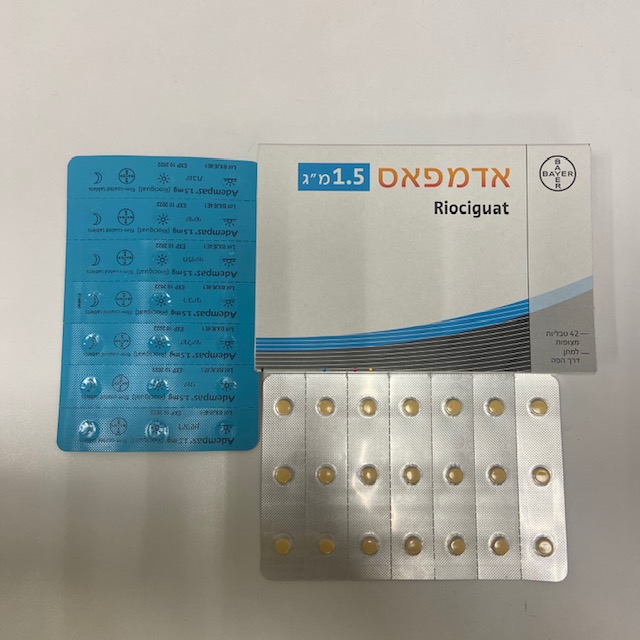Quest for the right Drug

אדמפאס 1.5 מ"ג ADEMPAS 1.5 MG (RIOCIGUAT)
תרופה במרשם
תרופה בסל
נרקוטיקה
ציטוטוקסיקה
צורת מתן:
פומי : PER OS
צורת מינון:
טבליות מצופות פילם : FILM COATED TABLETS
עלון לרופא
מינוניםPosology התוויות
Indications תופעות לוואי
Adverse reactions התוויות נגד
Contraindications אינטראקציות
Interactions מינון יתר
Overdose הריון/הנקה
Pregnancy & Lactation אוכלוסיות מיוחדות
Special populations תכונות פרמקולוגיות
Pharmacological properties מידע רוקחי
Pharmaceutical particulars אזהרת שימוש
Special Warning עלון לרופא
Physicians Leaflet
Adverse reactions : תופעות לוואי
4.8 Undesirable effects Summary of the safety profile The safety of Adempas has been evaluated in phase III studies of 681 patients with CTEPH and PAH receiving at least one dose of riociguat (see section 5.1). With longer observation in uncontrolled long term extension studies the safety profile was similar to that observed in the placebo controlled phase III trials. Most of the adverse reactions are caused by relaxation of smooth muscle cells in vasculature or the gastrointestinal tract. The most commonly reported adverse reactions, occurring in ≥10% of patients under Adempas treatment (up to 2.5 mg three times daily), were headache, dizziness, dyspepsia, peripheral oedema, nausea, diarrhoea and vomiting. Serious haemoptysis and pulmonary haemorrhage, including cases with fatal outcome have been observed in patients with CTEPH or PAH treated with Adempas (see section 4.4). The safety profile of Adempas in patients with CTEPH and PAH appeared to be similar, therefore adverse reactions identified from placebo controlled 12 and 16 weeks clinical studies are presented as pooled frequency in the table listed below (see table 1). Tabulated list of adverse reactions The adverse reactions reported with Adempas are listed in the table below by MedDRA system organ class and by frequency. Frequencies are defined as: very common (≥1/10), common (≥ 1/100 to < 1/10) . uncommon (≥ 1/1,000 to < 1/100), rare (≥1/10,000 to <1/1,000), very rare (<1/10,000) and not known (cannot be estimated from the available data). Table 1: Adverse reactions reported with Adempas in the phase III studies MedDRA Very common Common Uncommon System Organ Class Infections and infestations Gastroenteritis Blood and lymphatic system Anaemia (incl. respective disorders laboratory parameters) Nervous system disorders Dizziness Headache Cardiac disorders Palpitations Vascular disorders Hypotension Respiratory, thoracic and Haemoptysis Pulmonary mediastinal disorders Epistaxis haemorrhage* Nasal congestion Gastrointestinal disorders Dyspepsia Gastritis Diarrhoea Gastro-oesophageal reflux Nausea disease Vomiting Dysphagia Gastrointestinal and abdominal pains Constipation Abdominal distension General disorders and Oedema peripheral administration site conditions * fatal pulmonary haemorrhage was reported in uncontrolled long term extension studies Reporting of suspected adverse reactions Reporting suspected adverse reactions after authorisation of the medicinal product is important. It allows continued monitoring of the benefit/risk balance of the medicinal product. Any suspected adverse events should be reported to the Ministry of Health according to the National Regulation by using an online form https://sideeffects.health.gov.il

שימוש לפי פנקס קופ''ח כללית 1994
לא צוין
תאריך הכללה מקורי בסל
לא צוין
הגבלות
לא צוין
מידע נוסף
